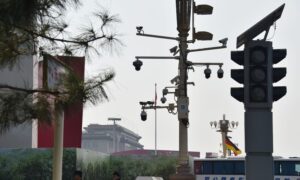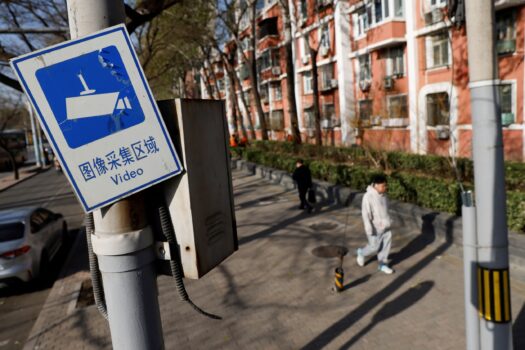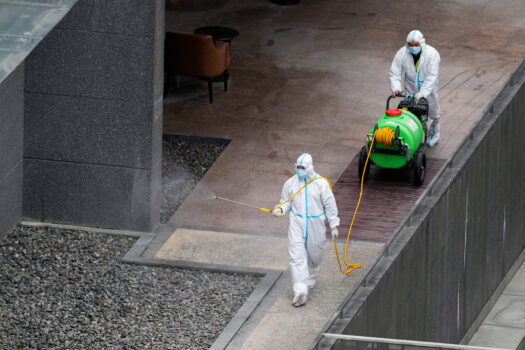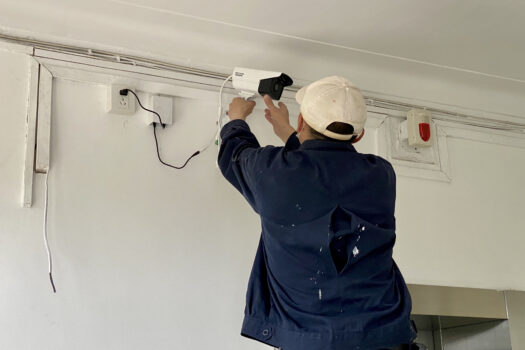China Has Become a Big Prison, Residents Under Surveillance by Property Managers
A homeowner in China’s Chengdu City found himself under constant surveillance by his property management company, which made him extremely uncomfortable. More and more people have realized that privacy is a luxury in communist China, where citizens have almost no civil rights.Jimu, a news outlet in Hubei Province, recently exposed two incidents that occurred in Chengdu, the capital city of neighboring Sichuan Province. In March 2021, Liu Yue (pseudonym) was shopping near his home when a stranger, a passerby, approached him and said, “The property managers are monitoring you 24 hours a day. You need to take precautions to protect yourself.” Liu felt puzzled as he did not know the person who spoke to him. A few months later, a security guard in Liu’s community told him that he often saw photos of Liu circulating in a WeChat group, and so he believed that Liu was probably being monitored. This time, Liu took the news more seriously. He then noticed that a few other security guards would point their cell phones at him, but as soon as Liu looked at them, they would immediately move the cell phone to the side. A sign saying the area is under video surveillance hangs on a pole while people walk on a street in Beijing, China, on Nov. 25, 2021. (Carlos Garcia Rawlins/Reuters) In April of this year, a departing property manager provided Liu with evidence showing that he was being monitored—a large number of WeChat screenshots and videos with Liu as the target of surveillance. Liu then realized that he had been under surveillance by the various property managers for more than a year. The property managers specifically formed a WeChat group where they shared information about Liu. When any of them captured him with their phone cameras, the information would be broadcast live in the chat group, including what time Liu left the house, when he walked his dog, which elevator he took, where he met a female friend, and which restaurant he went to. All such details were reported to a property manager surnamed Chen. In one of the screenshots provided to Liu, there was a photo showing him reading something on his cell phone, and the managers in the chat group lamenting that the resolution was not high enough for them to see what was on on the screen. After learning that he was being monitored, it became a burden for Liu to go home. He told Jimu that he had to prepare himself to be mentally strong each time he entered his residential compound, and he would wrap himself up as tightly as possible when he went out, come home as late as possible, and refrain from inviting friends to his apartment. Last month, Liu felt he had reached the limit, and decided to report the surveillance to the police. Liu learned that several other residents were also being monitored. Zhao Mei, a female resident, was one of them. After some investigation, Zhao learned in August that the property managers were monitoring her. They knew when she left or entered the community, where she went to dine or shop, and when her family came for a visit as their surveillance cameras followed her when she was in a public area. Similar to Liu’s situation, the property managers discussed and mocked her every move in the WeChat group. Zhao reported the occurrences to the police in late September. Zhao has already moved her belongings out of her apartment. She doesn’t dare go back and live there and plans to sell it even if at a loss. “Being monitored in real time certainly makes me feel very uncomfortable and unsafe,” Zhao told Jimu. Regarding the reasons for being monitored, Liu and Zhao said that they had each complained that the property management fees were too high and the service was unsatisfactory. They both attempted to initiate a homeowners’ committee, but were unsuccessful. They suspect that the property management company were retaliating because of their complaints. The property management company said it has set up a special team to deal with the matter, and the manager surnamed Chen has been suspended and is subject to police investigation. A lawyer surnamed Wang from Shijiazhuang, Hebei Province, told The Epoch Times on Nov. 11 that the original purpose of setting up property management companies was to provide services to home owners, but now they have turned around and monitored the owners, which is definitely a violation of the property management rules and also a violation of professional ethics. “Although the photos and videos were taken in a public area, they made the owner’s private information public in the group, which should be considered an invasion of privacy. However, invasion of privacy is not a criminal offense in China, but can only bring a civil lawsuit, such as demanding compensation and apology or claiming emotional trauma,” Wang said. Individual Privacy is Not Respected in China “Personal privacy” is a worthless concept in China under the Chinese Communist Party (CCP). According to the regime’s Public Security

A homeowner in China’s Chengdu City found himself under constant surveillance by his property management company, which made him extremely uncomfortable. More and more people have realized that privacy is a luxury in communist China, where citizens have almost no civil rights.
Jimu, a news outlet in Hubei Province, recently exposed two incidents that occurred in Chengdu, the capital city of neighboring Sichuan Province.
In March 2021, Liu Yue (pseudonym) was shopping near his home when a stranger, a passerby, approached him and said, “The property managers are monitoring you 24 hours a day. You need to take precautions to protect yourself.”
Liu felt puzzled as he did not know the person who spoke to him.
A few months later, a security guard in Liu’s community told him that he often saw photos of Liu circulating in a WeChat group, and so he believed that Liu was probably being monitored.
This time, Liu took the news more seriously. He then noticed that a few other security guards would point their cell phones at him, but as soon as Liu looked at them, they would immediately move the cell phone to the side.

In April of this year, a departing property manager provided Liu with evidence showing that he was being monitored—a large number of WeChat screenshots and videos with Liu as the target of surveillance.
Liu then realized that he had been under surveillance by the various property managers for more than a year.
The property managers specifically formed a WeChat group where they shared information about Liu. When any of them captured him with their phone cameras, the information would be broadcast live in the chat group, including what time Liu left the house, when he walked his dog, which elevator he took, where he met a female friend, and which restaurant he went to. All such details were reported to a property manager surnamed Chen.
In one of the screenshots provided to Liu, there was a photo showing him reading something on his cell phone, and the managers in the chat group lamenting that the resolution was not high enough for them to see what was on on the screen.
After learning that he was being monitored, it became a burden for Liu to go home. He told Jimu that he had to prepare himself to be mentally strong each time he entered his residential compound, and he would wrap himself up as tightly as possible when he went out, come home as late as possible, and refrain from inviting friends to his apartment.
Last month, Liu felt he had reached the limit, and decided to report the surveillance to the police.
Liu learned that several other residents were also being monitored. Zhao Mei, a female resident, was one of them.
After some investigation, Zhao learned in August that the property managers were monitoring her. They knew when she left or entered the community, where she went to dine or shop, and when her family came for a visit as their surveillance cameras followed her when she was in a public area. Similar to Liu’s situation, the property managers discussed and mocked her every move in the WeChat group.
Zhao reported the occurrences to the police in late September.
Zhao has already moved her belongings out of her apartment. She doesn’t dare go back and live there and plans to sell it even if at a loss.
“Being monitored in real time certainly makes me feel very uncomfortable and unsafe,” Zhao told Jimu.
Regarding the reasons for being monitored, Liu and Zhao said that they had each complained that the property management fees were too high and the service was unsatisfactory. They both attempted to initiate a homeowners’ committee, but were unsuccessful. They suspect that the property management company were retaliating because of their complaints.
The property management company said it has set up a special team to deal with the matter, and the manager surnamed Chen has been suspended and is subject to police investigation.
A lawyer surnamed Wang from Shijiazhuang, Hebei Province, told The Epoch Times on Nov. 11 that the original purpose of setting up property management companies was to provide services to home owners, but now they have turned around and monitored the owners, which is definitely a violation of the property management rules and also a violation of professional ethics.
“Although the photos and videos were taken in a public area, they made the owner’s private information public in the group, which should be considered an invasion of privacy. However, invasion of privacy is not a criminal offense in China, but can only bring a civil lawsuit, such as demanding compensation and apology or claiming emotional trauma,” Wang said.
Individual Privacy is Not Respected in China
“Personal privacy” is a worthless concept in China under the Chinese Communist Party (CCP). According to the regime’s Public Security Administration Punishment Law, anyone who peeps, secretly photographs, eavesdrops, or disseminates the private information of another person shall be detained for up to 5 days or fined up to 500 yuan (about $70). In more serious cases, he or she shall be detained for 5 to 10 days and may be fined up to 500 yuan.
In many cases, Chinese officials have openly violated the privacy of citizens. In April and May of this year, Shanghai was placed under lockdown to curb the transmission of COVID-19. The Shanghai authorities claimed that “disinfecting households is an important part of the epidemic prevention and control.” Some epidemic prevention officers therefore asked homeowners who were transferred to quarantine sites to hand over their house keys, and ordered personnel to enter the homes to conduct the so-called “disinfection.” A large number of such videos have gone viral on the internet, provoking public outrage.
Tong Zhiwei, a law professor at East China University of Political Science and Law, posted an article on social media on May 8, saying “No organization in Shanghai has the right to force people to surrender their house keys to [authorities] and [so someone can] enter their homes to disinfect,” and any official who issued such orders has committed the crime of “illegal intrusion into citizens’ homes.”
His article was immediately blocked by the authorities, and Tong’s social media accounts were all suspended.

The regime has also invaded citizens’ privacy during the non-epidemic period. Bitter Winter, a magazine that focuses on the human rights abuses in China, reported that a number of landlords in Hangzhou, Zhejiang Province, had received notices from the police asking them to install monitors in their rental apartments in the name of “burglary prevention.” The police require the monitors to be installed in the living room facing the front door, and rentals sites without a surveillance camera will be forbidden to continue in the rental business. The police also inspect the premises from time to time and fine violators.
Building Digital Totalitarianism
In 2019, British information service provider IHS Markit predicted that by the end of 2021, there would be approximately 1 billion surveillance cameras worldwide, of which 54 percent would be in China. That is, with 540 million surveillance cameras installed for a population of 1.46 billion, there are 372.8 cameras for every 1,000 people.
This is a relatively conservative estimate. Another estimate by IHS Markit put the number at 626 million CCTV cameras in China, which equates to 432.2 per 1,000 people.
The estimates were based on China’s overall population. In fact, CCTV presence for each 1,000 population would be higher in urban areas.

On Oct.13, the Montreal Institute for Genocide and Human Rights Studies (MIGS) in Canada held a book release for a book titled “Surveillance State: Inside China’s Quest to Launch a New Era of Social Control.”
According to the two authors, the CCP has established a state-level database as the basis for digital totalitarianism. Through digital technology, cloud technology, and other means, the regime connects the database with citizens’ identification documents, facial recognition data, fingerprints, and personal travel history to establish new control mechanisms. Then, the authorities can track all electronic products such as cell phones and computers, monitor private messages at any time, delete messages in seconds that are unfavorable to the authorities, and accurately locate the person who posted the messages. In particular, during the COVID-19 pandemic, the authorities extended 24-hour surveillance on the entire population through the “health code” cell phone app. The pandemic has ushered in a “new era” of surveillance for the CCP.
In an interview with the Epoch Times on Nov. 11, independent writer Zhuge Mingyang said, “China has become a veritable prison, with ‘eyes’ on you everywhere.”
Kane Zhang contributed to this report.












